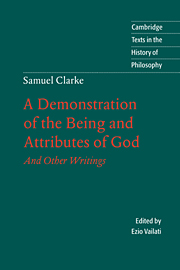Book contents
- Frontmatter
- Contents
- Acknowledgments
- List of abbreviations
- Introduction
- Chronology
- Further reading
- Note on the text
- A Demonstration of the Being and Attributes of God
- Other writings
- I Several Letters to the Reverend Dr. Clarke
- II The Answer to a Sixth Letter
- III The Answer to a Seventh Letter
- IV Letters to Dr. Clarke concerning Liberty and Necessity
- V From Remarks Upon a Book
- VI From Clarke's Sermons on Several Subjects
- VII From A Discourse concerning the Unchangeable Obligations of Natural Religion
- VIII From Four Defences of a Letter to Mr. Dodwell
- IX From A Collection of Papers which passed between the late learned Mr. Leibniz and Dr. Clarke
- Index
- Cambridge Texts in the History of Philosophy
II - The Answer to a Sixth Letter
Published online by Cambridge University Press: 07 January 2010
- Frontmatter
- Contents
- Acknowledgments
- List of abbreviations
- Introduction
- Chronology
- Further reading
- Note on the text
- A Demonstration of the Being and Attributes of God
- Other writings
- I Several Letters to the Reverend Dr. Clarke
- II The Answer to a Sixth Letter
- III The Answer to a Seventh Letter
- IV Letters to Dr. Clarke concerning Liberty and Necessity
- V From Remarks Upon a Book
- VI From Clarke's Sermons on Several Subjects
- VII From A Discourse concerning the Unchangeable Obligations of Natural Religion
- VIII From Four Defences of a Letter to Mr. Dodwell
- IX From A Collection of Papers which passed between the late learned Mr. Leibniz and Dr. Clarke
- Index
- Cambridge Texts in the History of Philosophy
Summary
[Editor's Note: We do not know the name of Clarke's correspondent. Clarke's letter dealt extensively with the issue of divine immensity and its compatibility with the fact that God is an immaterial thinking substance. It should be read in conjunction with supplementary text 1. The text is from Wii, 751–4]
Sir,
You will give me leave, without any preface or apology, to propose directly the best answer I can to the objections you have offered.
There are but two ways by which the being and all or any of the attributes of God can possibly be proved. The one, a priori; the other, a posteriori.
The proof a posteriori is level to all men's capacities because there is an endless gradation of wise and useful phenomena of nature, from the most obvious to the most abstruse, which afford at least a moral and reasonable proof of the being of God to the several capacities of all unprejudiced men who have any probity of mind. And this is what, I suppose, God expects, as a moral governor, that moral agents should be determined by.
- Type
- Chapter
- Information
- Samuel Clarke: A Demonstration of the Being and Attributes of GodAnd Other Writings, pp. 112 - 117Publisher: Cambridge University PressPrint publication year: 1998

